Odisha State Board BSE Odisha Class 10 English Grammar Book Solutions Chapter 6 Phrasal Verbs Textbook Exercise Activity Questions and Answers.
BSE Odisha Class 10 English Grammar Solutions Chapter 6 Phrasal Verbs
Look at the following sentences. [ତଳେ ଦିଆଯାଇଥିବା ବାକ୍ୟଗୁଡ଼ିକୁ ଦେଖ ।]
1. Look at this picture. (ଏହି ଛବିଟିକୁ ଚାହଁ ।)
2. Egg doesn’t agree with me. (ଅଣ୍ଡା ମୋ ଦେହରେ ଯାଉ ନାହିଁ ।)
3. The birds flew away. (ପକ୍ଷୀମାନେ ଉଡ଼ିଗଲେ ।)
4. I have run out of money. (ମୋ ପାଖରୁ ଟଙ୍କା ଶେଷ ହୋଇ ଆସିଲାଣି ।)
In the above sentences, the underlined words are two-word Verbs or Phrasal Verbs. [ଉପର ଲିଖ୍ ବାକ୍ୟମାନଙ୍କରେ ରେଖାଙ୍କିତ ଶବ୍ଦସବୁ two-word Verbs ବା Phrasal Verbs ରୂପେ ବ୍ୟବହୃତ ।]
1. What is a Phrasal Verb?
A Main Verb combined with a preposition or adverb particle is called a Phrasal Verb. [ଗୋଟିଏ ମୁଖ୍ୟ କ୍ରିୟା ସହିତ ଗୋଟିଏ ବିଭକ୍ତି ସୂଚକ ଅବ୍ୟୟ (preposition) ବା adverb particle ର ମିଶ୍ରଣରେ ଗଠିତ two-word verb କୁ Phrasal Verb କୁହାଯାଏ ।]
A Phrasal Verb has a new and different meaning from what we mean by a simple main verb. [ଏକ Phrasal Verb ର ଏକ ନୂଆ ଓ ଭିନ୍ନ ଅର୍ଥ ଥାଏ, ଯାହାକି ସେଇ Phrasal Verb ରେ ଥିବା ସାଧାରଣ ମୁଖ୍ୟ କ୍ରିୟାର ଅର୍ଥଠାରୁ ଭିନ୍ନ ।]
Examples :
Using the Simple main verb ‘put’. [ଏକ ସରଳ ମୁଖ୍ୟକ୍ରିୟା ‘put? ର ବ୍ୟବହାର ଦ୍ଵାରା]
(i) He put up in the hostel. (ସେ ହଷ୍ଟେଲରେ ରହିଲା ।)
(ii) The tail-enders put up a brave fight in the match against Australia. (ଅଷ୍ଟ୍ରେଲିଆ ଖେଳରେ ଶେଷଧାଡ଼ିର ବ୍ୟାଟ୍ସମ୍ୟାନ୍ମାନେ ଏକ ଲଢ଼ୁଆ ଖେଳ ପ୍ରଦର୍ଶନ କଲେ ।)
(iii) Mitali has put up a beautiful picture on the wall. (ମିତାଲି କାନ୍ଥରେ ଏକ ସୁନ୍ଦରଚିତ୍ର ଟଙ୍ଗାଇଛି ।)
(iv) They put up a play in the village. (ସେମାନେ ଗ୍ରାମରେ ଏକ ନାଟକ ମଞ୍ଚସ୍ଥ କଲେ ।)
(v) The students put up a tough question to the teacher. (ପିଲାମାନେ ଶିକ୍ଷକଙ୍କୁ ଏକ ଜଟିଳ ପ୍ରଶ୍ନ ପଚାରିଲେ।)
Difference between a Preposition and an Adverb Particle in the Phrasal Verb (Phrasal verb ରେ ଏକ Preposition ଓ ଏକ Adverb particle ମଧ୍ୟରେ ଥିବା ପାର୍ଥକ୍ୟ )
‘Preposition’ is before an object (noun or pronoun) but an adverb particle has no object after the verb. (Noun ବା pronoun ରୂପକ object ପୂର୍ବରୁ Preposition ବ୍ୟବହୃତ ହୁଏ; କିନ୍ତୁ Adverb particle ର verb ପରେ object ନଥାଏ ।)
Examples:
(i) Look at this picture. [at = preposition, this picture = object (noun phrase)
(ii) Egg doesn’t agree with me. [with = preposition, me = object (pronoun)]
(iii) The birds flew away. [away = adverb particle, (no object)]
(iv) Prices have come down. [down = adverb particle(no object)]
Structures of Phrasal Verbs:
(a) Verb + Adverb + Particles Examples:
(i) The children sat down.
(ii) The thief ran away. (ଦୌଡ଼ି ପଳାଇଲା)
(iii) Please come in (ଭିତରକୁ ଆସ).
(iv) The light went out (was extinguished, ଲିଭିଗଲା).
(v) The plane took off (left the ground, ଉଡ଼ାଣ ଆରମ୍ଭ କଲା).
(vi) How are you getting on (making progress, ଉନ୍ନତି କରୁଛେ) now?
(vii) The car has broken down (stopped working, ଅଚଳ ହୋଇ ପଡ଼ିଛି).
![]()
(b) Verb + Adverb Particle + Object
Examples:
(i) Take off (remove, କାଢ଼ି ଦିଅ) your hat.
(ii) Call in (summon, ଡକାଅ) the doctor.
(iii) He won’t give up (stop, ଛାଡ଼ିବ ନାହିଁ) his bad habits.
(c) Verb + Adverb Particle + Prepositional Particle
Examples:
(i) She puts up with (bears patiently, ଧୈର୍ଯ୍ୟର ସହିତ ସହି ନେଉଛନ୍ତି) a lot of trouble from her neighbors.
(ii) We want to do away with ଲୋପ କରିବା ପାଇଁ) the dowry system (ଯୌତୁକ ପ୍ରଥା).
(iii) Don’t look down on (have a low opinion of, ଘୃଣା କର ନାହିଁ) the poor.
(iv) Will you stand up for (support, ସମର୍ଥନ କରିବ କି ?) me?

Transitive Phrasal Verbs (with object) :
Examples:
Intransitive Phrasal Verbs
(i) My brother is looking for his book. (his job : Object) (ମୋ ଭାଇ ତା’ ବହି ଖୋଜୁଛି ।)
(ii) Suresh took off (removed, ଓହ୍ଲାଇ ଦେଲା) his clothes. (his clothes: Object)
Intransitive Phrasal Verbs (without object):
(i) The machine broke down (ଅଚଳ ହୋଇଗଲା).
(ii) The plane will take off (ଉଡ଼ାଣ କରିବ) now.
Particles with various meanings :
1. Up ( = completely)
Fill up with petrol ( ଭର୍ତ୍ତିକର).
The prices of vegetables are going up (ବଢୁଛି).
2. Down (= completely to the ground)
They knocked down the building (ଧରାଶାୟୀ କଲେ).
Cut down the tree.
(= decreasing) : He turned the TV down. (ଶବ୍ଦ କମାଇ ଦେଲା)
Will the government bring down the prices? ( କମାଇବେ, ହ୍ରାସକରିବେ)
3. Over (= from start to finish)
I thought the problem over. ( ଆରମ୍ଭରୁ ଶେଷ ପର୍ଯ୍ୟନ୍ତ ଚିନ୍ତା କରି)
4. On (= connect) Switch on the lights. (ଜଳାଅ)
(=continue) Hold on, please. (ଫୋନଟି ଧରିରଖ)
Carry on (ଚାଲୁରଖ) the work.
5. Off(=departing)
The thief ran off. (ପଳାୟନ କଲା)
The pain is wearing off. ( ଯନ୍ତ୍ରଣା ଦୂରେଇ ଯାଉଛି)
![]()
6. Out (=disappearing)
Mother washed out the dirt. (ଧୋଇ ଛଡ଼ାଇ ଦେଲେ)
Cross out the mistakes. (ଛକି ପକାଅ)
(=completely) : Work out the sums. (ପୂରାପୂରି କଷିଦିଅ ।)
(=aloud) The teacher called out the names. (ବଡ଼ପାଟିରେ ଡ଼ାକିଲେ)
I read out the letter to him. (ଚିଠିଟିକୁ ବଡ଼ପାଟିରେ ପଢ଼ି ଶୁଣାଇଲି ।)
Let’s look at the phrasal verbs made with the verb ‘BREAK’ and ‘TAKE’ :
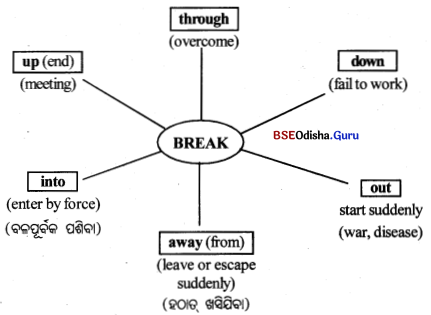
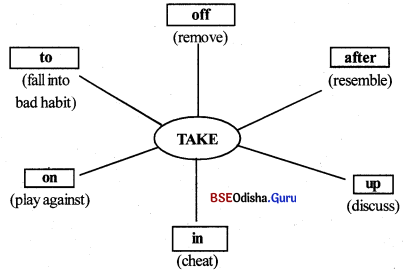
Some Common Phrasal Verbs
I. Transitive Phrasal Verbs [ Verb + Particle + Object]
1. abide by [to act according to law](ନିୟମ ମାନି ଚଳିବା)
A good citizen must abide by the traffic rules.
(ଜଣେ ଉତ୍ତମ ନାଗରିକ ଟ୍ରାଫିକ ନିୟମ ମାନି ଚଳିବା ଉଚିତ ।)
2. account for [to explain the cause of something](କାରଣ ଦର୍ଶାଇବା)
His illness accounts for his absence. (ଅସୁସ୍ଥତା ଯୋଗୁଁ ସେ ଅନୁପସ୍ଥିତ ଅଟେ ।)
3. agree with [to suit somebody’s health] (ସ୍ବାସ୍ଥ୍ୟପ୍ରତି ଅନୁକୂଳ ହେବା)
Fish doesn’t agree with me. (ମାଛ ମୋ ଦେହରେ ଯାଏ ନାହିଁ ।)
![]()
4. bank on [to depend on] (ନିର୍ଭର କରିବା)
I bank on my teachers for my study. (ମୋ ପାଠ ପାଇଁ ମୁଁ ଶିକ୍ଷକମାନଙ୍କ ଉପରେ ନିର୍ଭର କରେ ।)
5. break into [to enter by force] (ବଳପୂର୍ବକ ପ୍ରବେଶ କରିବା)
The thieves broke into our house last night.
(ଗତକାଲି ରାତିରେ ଚୋରମାନେ ଆମ ଘରେ ବଳପୂର୍ବକ ପ୍ରବେଶ କଲେ ।)
6. call on [to visit someone](ଦେଖା କରିବା)
I called on my headmaster to thank him.
( ଧନ୍ୟବାଦ ଦେବାପାଇଁ ମୁଁ ପ୍ରଧାନ ଶିକ୍ଷକଙ୍କୁ ଦେଖାକଲି ।)
7. go into [to examine /investigate in detail] (ତଦନ୍ତ କରିବା/ ଟିକିନିଖ୍ ପରୀକ୍ଷା କରିବା)
You should go into the problem before coming to any conclusion.
(ସିଦ୍ଧାନ୍ତରେ ପହଞ୍ଚିବା ପୂର୍ବରୁ ତୁମେ ସମସ୍ୟା ବିଷୟରେ ଟିକିନିଖ୍ ଜାଣିନେବା ଉଚିତ ।)
8.(a) go through [to experience something unpleasant] (କୌଣସି ଅସୁଖୀକର ଅନୁଭୂତିର ସମ୍ମୁଖୀନ ହେବା)
They have gone through a lot of suffering. (ସେମାନେ ଅନେକ ଦୁର୍ଦ୍ଦଶାର ସମ୍ମୁଖୀନ ହୋଇଛନ୍ତି ।)
(b) [to read/ use/ spend/ eat all of something] (ମୂଳରୁ ଶେଷ ପର୍ଯ୍ୟନ୍ତ ପଢ଼ିବା। ସବୁକିଛି ଖାଇ ଶେଷ କରି ଦେବା/ସବୁ ଖର୍ଚ୍ଚ କରିଦେବା)
Have you gone through the Ramayan ? (ତୁମେ ରାମାୟଣକୁ ଆମୂଳଚୂଳ ପଢ଼ିଛ କି ?)
9. keep off [to avoid something/ somebody] (କୌଣସି ବ୍ୟକ୍ତି/ଜିନିଷଠାରୁ ଦୂରେଇ ରହିବା)
You should keep off bad company. (ତୁମେ ଖରାପ ସାଙ୍ଗମାନଙ୍କ ଠାରୁ ଦୂରେଇ ରହିବା ଉଚିତ ।)
10. keep on [to continue doing something] (କୌଣସି କାର୍ଯ୍ୟ ଚାଲୁ ରଖୁବା)
We kept on working long after the evening. (ସଂଧ୍ୟାପରେ ଆମ୍ଭେମାନେ କାର୍ଯ୍ୟ ଚାଲୁରଖିଲୁ ।)
11. laugh at [to mock at somebody/something] (ଥଟ୍ଟା କରିବା)
Don’t laugh at the poor. (ଦରିଦ୍ରମାନଙ୍କୁ ପରିହାସ | ଥଟ୍ଟା କର ନାହିଁ ।)
12. look after [to take care of somebody / something] (ଯତ୍ନନେବା)
Who is looking after the sick man ? (କିଏ ଏହି ରୋଗଗ୍ରସ୍ତ ବ୍ୟକ୍ତିର ଯତ୍ନ ନେଉଛି ? )
13. look upon [to consider somebody] (ବିବେଚନା କରିବା)
I look upon Reeta as my own sister. (ମୁଁ ରୀତାକୁ ମୋ ଭଉଣୀ ଭାବରେ ବିବେଚନା କରେ।)
We look upon Madhusudan Utkal Gaurav.
(ଆମ୍ଭେମାନେ ମଧୁସୂଦନଙ୍କୁ ଉତ୍କଳ ଗୌରବ ରୂପେ ବିବେଚନା କରୁ ।)
14. send for [to ask someone to come](ଡକାଇ ପଠାଇବା)
We sent for a doctor when my mother was ill.
(ମା’ ଅସୁସ୍ଥ ଥିଲାବେଳେ ଆମ୍ଭେମାନେ ଜଣେ ଡାକ୍ତରଙ୍କୁ ଡକାଇ ପଠାଇଲୁ ।)
15. stand by [to help and support some one in difficulties ] (ଅସୁବିଧାବେଳେ ଜଣକୁ ସାହାଯ୍ୟ କରିବା)
My parents stand by me during my difficulties.
(ମୋର ଅସୁବିଧାବେଳେ ମୋର ବାପାମା’ ମୋତେ ସମର୍ଥନ କରିଥାନ୍ତି ।)
16. look into [to investigate](ତଦନ୍ତ କରିବା)
The police are looking into the murder case. (ପୋଲିସ୍ମାନେ ହତ୍ୟାକାଣ୍ଡର ତଦନ୍ତ କରୁଛନ୍ତି ।)
17. make for [to move towards some place](ଅଗ୍ରସର ହେବା)
The children are making for school. (ପିଲାମାନେ ସ୍କୁଲକୁ ଯାଉଛନ୍ତି ।)
![]()
18. come across/upon [ to meet someone/ something by chance] (ହଠାତ୍ ଜଣଙ୍କ ସହିତ ଭେଟ ହୋଇଯିବା| ହଠାତ୍ କିଛି ଲାଭ କରିବା)
I came across an old friend in the market.
(ବଜାରରେ ମୋର ହଠାତ୍ ଜଣେ ପୁରୁଣା ବନ୍ଧୁ ସହିତ ଦେଖା ହୋଇଗଲା ।)
19. hit on [ to think of a good idea suddenly] (ହଠାତ୍ ଏକ ଉତ୍ତମ ଚିନ୍ତା ପାଞ୍ଚବା)
At last the rabbit hit on an idea to outwit the lion.
( ସିଂହକୁ ବୋକା ବନେଇବା ପାଇଁ ଠେକୁଆ ଶେଷରେ ଏକ ଉପାୟ ପାଞ୍ଚିଲା ।)
20. come over [strong feelings affecting somebody] (ପ୍ରଭାବିତ କରିବା/ ବିରାଟ ପରିବର୍ତ୍ତନ ଆଣିବା)
A great change came over Ashok after the Kalinga war.
(କଳିଙ୍ଗ ଯୁଦ୍ଧପରେ ଅଶୋକଙ୍କ ଠାରେ ଏକ ବିରାଟ ପରିବର୍ତ୍ତନ ଦେଖାଗଲା ।)
II. Intransitive Phrasal Verbs (ଅକର୍ମକ) [Verb + Particle]
1. break down [ to lose control of one’s feelings](ନିଜ ଉପରୁ ନିୟନ୍ତ୍ରଣ ହରାଇବା)
The woman broke down on hearing her only son’s death.
2. break out [to begin and spread suddenly] (ହଠାତ୍ ବ୍ୟାପିଯିବା– ରୋଗ, ନିଆଁ ଇତ୍ୟାଦି)
The fire broke out at midnight. (ମଧ୍ୟରାତ୍ରିରେ ନିଆଁ ବ୍ୟାପିଗଲା ।)
3. come about [ to happen](ଘଟିବା)
How did the accident come about ? (ଦୁର୍ଘଟଣାଟି କିପରି ଘଟିଲା ?)
4. come out [ to be visible / to appear](ଦେଖାଯିବା)
The sun comes out in the morning. (ସୂର୍ଯ୍ୟ ସକାଳେ ବାହାରି ଆସେ ।)
5. fall out [to quarrel](କଳି କରିବା)
The two brothers fell out and came to blows. (ଦୁଇ ଭାଇ କଳି କଲେ ଓ ମୁଥ ମରାମରି କଲେ ।)
6. give in [to surrender] (ଆତ୍ମସମର୍ପଣ କରିବା)
The soldiers fought on but finally gave in.
(ସୈନ୍ୟମାନେ ଯୁଦ୍ଧ କରିଥିଲେ, କିନ୍ତୁ ଶେଷରେ ଆତ୍ମସମର୍ପଣ କଲେ ।)
7. go out [ to stop burning](ଜଳିବା ବନ୍ଦ ହେବା |ଲିଭିଯିବା)
The fire has gone out. (ନିଆଁ ଲିଭି ଯାଇଛି ।)
8. take off [ to leave ground, plane]( ଉଡ଼ାଜାହାଜ ଭୂମି ଛାଡ଼ିବା)
When will the flight take off ? ( ଉଡ଼ାଜାହାଜଟି କେତେବେଳେ ଘାଟି ଛାଡ଼ିବ ?)
9. pass away [dic](ମରିଯିବା)
His father passed away at the age of eighty. (ତାଙ୍କ ବାପା ଅଶୀ ବର୍ଷ ବୟସରେ ଦେହତ୍ୟାଗ କଲେ ।)
10. fall through [fail to be implemented] (ଯୋଜନା ଆଦି ଅସଫଳ ହେବା)
All his plans to go abroad fell through due to his father’s sudden demise. ଯୋଗୁଁ ତାହାର ବିଦେଶ ଯିବାର ସମସ୍ତ ଯୋଜନା ଅସଫଳ ହେଲା ।)
(ତାଙ୍କ ବାପାଙ୍କ ଅକାଳ ମୃତ୍ୟୁ
11. hold on [to wait](ଅପେକ୍ଷା କରିବା)
Please hold on; I’ll call my father. (ଦୟାକରି ଅପେକ୍ଷା କର; ମୁଁ ବାପାଙ୍କୁ ଡାକୁଛି ।)
12. set in [season/ weather begin and continue] (ଋତୁ, ପାଗ ଆରମ୍ଭ ହୋଇ ଜାରି ରହିବା)
Winter has set in. (ଶୀତଋତୁ ଆରମ୍ଭ ହୋଇ ଯାଇଛି ।)
13. turn up [come to / arrive at a meeting / assembly](ସଭା/ ସମ୍ମିଳନୀରେ ପହଞ୍ଚିବା)
Only a few students turned up for the meeting. (କେବଳ ଅଳ୍ପ କେତେଜଣ ପିଲା ସଭାରେ ପହଞ୍ଚିଲେ ।)
14. give away [to distribute] (ବାଣ୍ଟିବା)
The chief guest gave away the prizes. ( ମୁଖ୍ୟ ଅତିଥୁ ପୁରସ୍କାରଗୁଡ଼ିକୁ ବାଣ୍ଟିଲେ ।)
15. die away [sound becoming slow and weak](ଶବ୍ଦ| କାକଳୀ ଆଦି କମି ଆସିବା)
The noise the spectators died away. (ଦର୍ଶକମାନଙ୍କର ଧ୍ଵନି କମି ଆସିଲା ।)
16.go up [price becoming more]( ମୂଲ୍ୟବୃଦ୍ଧି ହେବା)
The price of essential commodities has gone up.
(ଆବଶ୍ୟକୀୟ ଜିନିଷଗୁଡ଼ିକର ମୂଲ୍ୟ ବୃଦ୍ଧି ଘଟିଛି ।)
17. go down [price beginning to be less](ମୂଲ୍ୟ ହ୍ରାସ ଘଟିବା )
The price of rice has gone down. (ଚାଉଳର ମୂଲ୍ୟ କମିଯାଇଛି।)
18. wear out [to become thin / weak through constant use] (ବାରମ୍ବାର ବ୍ୟବହାର ଯୋଗୁଁ କ୍ଷୟ ହୋଇଯିବା)
My shoes have worn out. (ମୋ ଜୋତା ଛିଣ୍ଡିଗଲାଣି ।)
![]()
19. get up [to leave bed after sleeping](ଶଯ୍ୟାତ୍ୟାଗ କରିବା)
When will the child get up ? (ପିଲାଟି କେତେବେଳେ ବିଛଣାରୁ ଉଠିବ ?)
20. look out [to be careful] (ସତର୍କ ରହିବା)
Look out ! There might be a snake.
( ସତର୍କ ରୁହ ! ଏଠାରେ ସାପଟିଏ ଥାଇପାରେ ।)
III (A) Verb + Object + Particle
1. answer back [to reply rudely] (ନିଷ୍ଠୁରଭାବରେ ଉତ୍ତର ଦେବା)
It is not proper to answer your parents back.(ବାପାମା’ଙ୍କୁ ନିଷ୍ଠୁର ଭାବରେ ଜବାବ ଦେବା ଭଲ ନୁହେଁ ।)
2. count….in [ to include](ସାମିଲ କରିବା)
If you are going on a picnic, please count me in.
(ଯଦି ତୁମେ ବଣଭୋଜିରେ ଯାଉଛ, ଦୟାକରି ମୋତେ ସାମିଲ କରିବ ।)
3. see….through [ to help somebody during difficult times(ଅସୁବିଧା ସମୟରେ ସାହାଯ୍ୟ କରିବା)
Her courage saw her through during hard times. (her-object)
(ତାହାର ସାହସ ଅସୁବିଧା ବେଳେ ତାକୁ ଖୁବ୍ ସାହାଯ୍ୟ କରିଥିଲା ।)
4. take….for [to consider somebody wrongly](ଜଣକୁ ଭୁଲ୍ ଧରି ନେବା)
My friend took my aunt for my mother. (my aunt = object)
(ମୋ ସାଙ୍ଗ ମୋ ମାଇଁଙ୍କୁ ଭୁଲ ଭାବରେ ମୋ ମା’ ରୂପେ ଧରିନେଲେ ।)
5. tear….away [to leave something unwillingly] (ଅନିଚ୍ଛା ସତ୍ତ୍ଵେ କୌଣସି ଜାଣିବା କାର୍ଯ୍ୟରୁ ଦୂରେଇ ରହିବା)
I have to tear myself away from the TV to study.
(ପାଠ ପଢ଼ିବା ପାଇଁ ମୋତେ ଟିଭି ଦେଖାରୁ ଦୂରେଇ ରହିବାକୁ ପଡ଼ିବ ।)
6. tell …..apart (ପ୍ରଭେଦ ଦେଖାଇବା)
You can’t tell the two brothers apart. (the two brothers= object)
(ତୁମେ ଦୁଇ ଭାଇଙ୍କ ମଧ୍ୟରେ ପାର୍ଥକ୍ୟ ବାରି ପାରିବ ନାହିଁ ।)
7. tell….off [to scold/ tell angrily] (ଗାଳିଦେବା/ ଖରାପ ଭାଷାରେ କହିବା)
The teacher told Raju off for not doing his homework.
(ଘରପଢ଼ା କରି ନଥୁବାରୁ ଶିକ୍ଷକ ରାଜୁକୁ ଗାଳି ଦେଲେ ।)
III (B) Verb + Particle + Object କିମ୍ବା, Verb + Object + Particle
1. blow up [to destroy something by an explosion] (ବିସ୍ଫୋରଣ ଘଟାଇ ଧ୍ବଂସ କରିବା)
The terrorists blew up the bridge.(ଆତଙ୍କବାଦୀମାନେ ପୋଲଟିକୁ ଉଡ଼ାଇଦେଲେ ।)
2. bring about [cause to happen] (ଘଟାଇବା। ଘଟଣାର କାରଣ ହେବା)
Education has brought about many changes in society.
(ଶିକ୍ଷା ସମାଜରେ ଅନେକ ପରିବର୍ତ୍ତନ ଆଣିପାରିଛି ।)
3. bring down [lower prices / aeroplanes] (ଦରଦାମ୍/ ଉଡ଼ାଜାହଜ ଖସାଇବା | ନିମ୍ନମୁଖୀ ହେବା ।)
The pilot brought down the plane. (ଉଡାଜାହାଜଟିକୁ ପାଇଲଟ୍ ତଳକୁ ଖସାଇଲେ ।)
Good harvest has brought down the prices of vegetables.
4. bring out [to publish] (ପ୍ରକାଶ କରିବା)
I am going to bring out a new book this week.
(ଏହି ସପ୍ତାହରେ ମୁଁ ଏକ ନୂତନ ପୁସ୍ତକଟିଏ ପ୍ରକାଶ କରିବି ।)
5. bring up [to educate/ take care of a child] (ଶିକ୍ଷିତ କରିବା; ଲାଳନ ପାଳନ କରିବା )
We should bring up children with care. (ଆମ୍ଭେମାନେ ପିଲାମାନଙ୍କୁ ଯତ୍ନରେ ପାଳନ କରିବା ଉଚିତ ।)
6. call off [to cancel] (ରଦ୍ଦ କରିବା/ ପ୍ରତ୍ୟାହାର କରିନେବା)
The strike was called off. (ଧର୍ମଘଟ ସ୍ଥଗିତ ହେଲା ।)
![]()
7. carry on [to continue] (ଚାଲୁ ରଖିବା)
We carried on working till the end. (ଶେଷ ହେବା ପର୍ଯ୍ୟନ୍ତ ଆମେ କାର୍ଯ୍ୟଟି ଚାଲୁରଖୁଲୁ ।)
8. carry out
(a)[to do something that you have been told to do] (ଆଦେଶ/ନିର୍ଦ୍ଦେଶ ପାଳନ କରିବା)
I carried out the instructions of my parents. (ମୁଁ ମୋ ପିତାମାତାଙ୍କ ନିର୍ଦ୍ଦେଶ ପାଳନ କଲି ।).
(b) [to do a particular piece of work] (ଏକ ନିର୍ଦ୍ଦିଷ୍ଟ କାର୍ଯ୍ୟ କରିବା )
The construction of this building was carried out last year.
9. close down [close permanently] (ସବୁଦିନ ପାଇଁ ବନ୍ଦ ରଖିବା)
We closed down the factory after a fire. (ଅଗ୍ନିକାଣ୍ଡ ପରେ ଆମେ କାରଖାନାକୁ ବନ୍ଦ କରିଦେଲୁ ।)
10. cut down [to reduce an amount of something] (କିଛିର ପରିମାଣ ହ୍ରାସ କରିବା)
We cut down our expenses after our father’s retirement.
(ପିତାଙ୍କ ଅବସର ପରେ ଆମେ ଆମର ଖର୍ଚ୍ଚକାଟ କରୁ ।)
11. cut off [to stop the supply of something] (ଯୋଗାଣ ବନ୍ଦ କରିବା| ଯୋଗାଣ ବ୍ୟାହତ ହେବା)
Electricity was cut off after the cyclone. (ବାତ୍ୟାପରେ ବିଦ୍ୟୁତ୍ ଯୋଗାଣ ବ୍ୟାହତ ହେଲା ।)
12. do up [to make something attractive by repair, painting or make-up.]
(ପରିଷ୍କାର କରିବା| ଆକର୍ଷଣୀୟ କରିବା)
We did up our houses before our sister’s marriage ceremony.
(ଆମେ ଆମର ଘରକୁ ଭଉଣୀର ବିଭାଘର ପୂର୍ବରୁ ସୁସଜ୍ଜିତ କଲୁ ।)
13. find out [to know something by enquiry] (ଖୋଜି ବାହାର କରିବା )
Please find out the date of our annual examination from the notice board.
14. fix up [to arrange something to happen] (କିଛି କାର୍ଯ୍ୟକ୍ରମ ପାଇଁ ବ୍ୟବସ୍ଥା ଗ୍ରହଣ କରିବା)
We have fixed up the meeting for the next week.(ଆସନ୍ତା ସପ୍ତାହରେ ସଭା ପାଇଁ ବ୍ୟବସ୍ଥା କରିଛୁ ।)
15. give away [to distribute] (ବାଣ୍ଟିଦେବା। ଦେଇଦେବା)
The chief guest gave away the prizes.(ମୁଖ୍ୟ ଅତିଥୁ ପୁରସ୍କାରଗୁଡ଼ିକ ବିତରଣ କଲେ ।)
16. give up [to stop doing something] (ତ୍ୟାଗ କରିବା| କିଛି କାର୍ଯ୍ୟ ବନ୍ଦ ରଖିବା)
I have given up smoking. Don’t give up hopes. (ଆଶା ପରିତ୍ୟାଗ କର ନାହିଁ ।)
17. hold up [to obstruct] (ଅଟକାଇବା| ଧରି ରଖୁବା)
A marriage procession held up the traffic for long hours.
18. keep up [to keep something at a high level] (ବଜାୟ ରଖୁବା )
We must try to keep up the honour of our school.
(ଆମ ସ୍କୁଲର ସମ୍ମାନ ଲାଗି ଆମେ ଚେଷ୍ଟା ଅବ୍ୟାହତ ରଖିବା ଉଚିତ ।)
19. knock down [to hit somebody and make him fall to the ground] (ଧକ୍କା / ଆଘାତ ଦେଇ ତଳେ ପକାଇ ଦେବା)
A car knocked my sister down.(ଗୋଟିଏ କାର୍ ମୋ ଭଉଣୀକୁ ଧକ୍କା ଦେଲା ।)
20. lay down [to state a plan officially] ( ଯୋଜନା ଉପସ୍ଥାପନ କରିବା)
We laid down the plan of our journey and went ahead accordingly.
(ଆମେ ଏକ ଯୋଜନା ପ୍ରସ୍ତୁତ କଲୁ ଏବଂ ତଦନୁସାରେ ଅଗ୍ରସର ହେଲୁ ।)
21. lay by [to save something for future use] (ଭବିଷ୍ୟତ ବ୍ୟବହାର ପାଇଁ ସଞ୍ଚୟ କରିବା। ସାଇତି ରଖୁବା)
Everyone must lay something by for their old age.
(ପ୍ରତ୍ୟେକ ସେମାନଙ୍କ ବାର୍ଦ୍ଧକ୍ୟ ନିମିତ୍ତ ସଞ୍ଚୟ କରିବା ଉଚିତ ।)
![]()
22. let down [to disappoint somebody by not doing something well]
(ଜଣକ ପାଇଁ କିଛି କାର୍ଯ୍ୟ ନକରି ଶେଷରେ ହତାଶ କରିବା)
I let down my parents with my poor results.
( ମୁଁ ମୋର ଖରାପ ଫଳାଫଳରେ ମୋ ପିତାମାତାଙ୍କୁ ନିରାଶ କଲି ।)
23. look up [to search for something in a dictionary or a book of reference]
(ପୁସ୍ତକ ଖୋଲି ସେଥୁରୁ କିଛି ଦେଖିବା| ଜାଣିବା)
Please look up the word in a dictionary.
(ଦୟାକରି ଅଭିଧାନରୁ ଶବ୍ଦଟିକୁ ଦେଖ ।)
24. make out [to hear/ understand someone with difficulty]
(କଷ୍ଟରେ କିଛି ଶୁଣିବା | ବୁଝିପାରିବା ବା ଜାଣିବା)
I can hardly make out what you say. (ସେ କ’ଣ କହେ ମୁଁ ପ୍ରାୟ ବୁଝିପାରେ ନାହିଁ ।)
25. make up [to replace some lost thing] (ଭରଣା କରିବା | (କ୍ଷତି) ପୂରଣ କରିବା)
We must work hard to make up the lost hours.
(ବରବାଦ କରିଥିବା ସମୟକୁ ଭରଣା କରିବା ପାଇଁ ଆମ୍ଭେମାନେ ପରିଶ୍ରମ କରିବା ଉଚିତ ।)
26. pack up [to stop working] (କାର୍ଯ୍ୟ ବନ୍ଦ କରିବା)
It’s getting darker. We should pack up and go home.
(ଅନ୍ଧାର ମାଡ଼ିଆସୁଛି । ଆମେ କାର୍ଯ୍ୟବନ୍ଦ କରି ଜିନିଷପତ୍ର ସଜାଡିବା ଉଚିତ ଓ ଘରକୁ ଯିବା ଉଚିତ ।)
27. pick out [to choose] (ପସନ୍ଦ କରିବା | ବାଛିବା)
We picked out the best players for our cricket team.
28. point out [to direct attention to something] (ନିର୍ଦ୍ଦେଶ କରିବା; ଦେଖାଇଦେବା)
The teacher pointed out the errors. (ଶିକ୍ଷକ ଭୁଲଗୁଡ଼ିକୁ ଦେଖାଇଦେଲେ ।)
29. pull down [to destroy] (ନଷ୍ଟ | ଧ୍ୱଂସ କରିଦେବା)
We pulled down the old building to build a new one.
(ନୂଆ କୋଠାଘର ନିର୍ମାଣପାଇଁ ଆମେ ପୁରାତନ ଅଟ୍ଟାଳିକାକୁ ନଷ୍ଟ କରୁ ।)
30. put down
(a) [to write down] (ଲିପିବଦ୍ଧ କରିବା/ ଟିପି ରଖୁବା)
Put down your request on a piece of paper. (ଖଣ୍ଡେ କାଗଜରେ ତୁମର ଦାବି ଲେଖ ।)
(b) [to suppress] (ଦମନ କରିବା)
The riot was put down firmly. (ଦଙ୍ଗାକୁ ଦୃଢ଼ଭାବରେ ଦମନ କରାଗଲା ।)
31. put on [to wear something] (ବସ୍ତ୍ର ଆଦି ପରିଧାନ କରିବା)
Put on warm clothes before going out in the cold. (ବାହାରେ ଥଣ୍ଡାରେ ଯିବା ପୂର୍ବରୁ ଗରମ ପୋଷାକ ପିନ୍ଧ ।)
32. put off [to keep something for a later date] (ଅନ୍ୟ ସମୟକୁ ସ୍ଥଗିତ ରଖୁବା)
Don’t put off today’s work for tomorrow.
33. put out [to stop something burning] (ନିଆଁ ଲିଭାଇ ଦେବା)
The firemen put out the fire with water. (ନିଆଁଲିଭାଳି ପାଣିରେ ନିଆଁକୁ ଲିଭାଇଲେ ।)
34. rule out [to stop/ exclude something as a possibility]
(ବନ୍ଦ ରଖ୍ / ସମ୍ଭାବନା ଦୃଷ୍ଟିରୁ କିଛି ବାଦ୍ କରିଦେବା)
It may rain today. The possibility of cricket match cannot be ruled out.
35. run over [to hit somebody and drive over it] (ଆଘାତ ଦେଇ ଗାଡ଼ି ମାଡ଼ିଯିବା)
The speeding car ran over a street dog.
36. see off [to go to a railway station, bus-stop or airport to say goodbye to somebody]
I went to the station to see off my friends. ( ମୁଁ ମୋ ବନ୍ଧୁମାନଙ୍କୁ ବିଦାୟ ଦେବାପାଇଁ ଷ୍ଟେସନ୍କୁ ଯାଇଥୁଲି ।)
![]()
37. set up [to start business or an institution] (ବ୍ୟବସାୟ | ଅନୁଷ୍ଠାନ ପ୍ରତିଷ୍ଠା କରିବା )
I plan to set up a business after I pass out matriculation.
(ମାଟ୍ରିକୁଲେସନ୍ ପାସ୍ କରିବା ପରେ ମୁଁ ବ୍ୟବସାୟ ଆରମ୍ଭ କରିବାକୁ ଯୋଜନା କରୁଛି ।)
38. show off [to show something to others that you are proud of] (ଦେଖେଇ ହେବା)
Children like to show off their toys to others. (ପିଲାମାନେ ସେମାନଙ୍କ ଖେଳଣାଗୁଡ଼ିକୁ ଅନ୍ୟମାନଙ୍କୁ ଦେଖାଇ ହୁଅନ୍ତି ।)
39. take over [to take charge of another person’s work] (ଅନ୍ୟର କାର୍ଯ୍ୟ ହାତକୁ ନେବା/କାର୍ଯ୍ୟଭାର ଗ୍ରହଣ କରିବା)
The new headmaster took over charge from the old headmaster.
(ପୂର୍ବ ପ୍ରଧାନଶିକ୍ଷକଙ୍କଠାରୁ ନୂତନ ପ୍ରଧାନଶିକ୍ଷକ ଦାୟିତ୍ଵ ଗ୍ରହଣ କଲେ ।)
40. take off [to remove dress etc.] (ପୋଷାକ ପରିଚ୍ଛଦ ଇତ୍ୟାଦି କାଢ଼ିବା)
We take off shoes before entering temples.
(ମନ୍ଦିର ଭିତରକୁ ପ୍ରବେଶ କରିବା ପୂର୍ବରୁ ଆମେ ଜୋତା କାଢୁ ।)
41. turn down [to reject an offer / request] (ଅନୁରୋଧ | ଦାନ ଆଦି ପ୍ରତ୍ୟାଖ୍ୟାନ କରିବା)
(a) The government turned down the employee’s request for a pay revision.
(b) Who can turn down such a good job ? (କିଏ ଏଭଳି ଭଲ ଚାକିରି ପ୍ରତ୍ୟାଖ୍ୟାନ କରିପାରେ ?)
42. turn on [to switch on a machine or light] (ଆଲୋକ ଜଳାଇବା । ଯନ୍ତ୍ରପାତି ଚଳାଇବା)
Please turn on the generator. (ଦୟାକରି ଜେନେରେଟର୍ ଚଳାଅ ।)
43. use up [to use all of something so that nothing is left] (ବ୍ୟବହାର କରି ଶେଷ କରିଦେବା)
I have used up all the petrol in my car. (ମୁଁ ମୋ କାର୍ରେ ଥିବା ସବୁ ପେଟ୍ରୋଲ ସାରି ଦେଇଛି ।)
44. wipe up [to destroy something completely] (ସଂପୂର୍ଣ୍ଣ ନଷ୍ଟ କରିଦେବା, ନିଶ୍ଚିହ୍ନ କରିଦେବା)
Many villages were wiped out in the last super cyclone.
(ଗତ ମହାବାତ୍ୟାରେ ଅନେକ ଗାଁ ନିଶ୍ଚିହ୍ନ ହୋଇଯାଇଛି ।)
45. work out [solve a problem / sum / puzzle] (ସମସ୍ୟା/ ଅଙ୍କ | ଧନ୍ଦା ସମାଧାନ କରିଦେବା/ ବୁଝିପାରିବା/
Only intelligent students can work out this sum. (କେବଳ ବୁଦ୍ଧିମାନ ଛାତ୍ରମାନେ ଏ ଅଙ୍କଟିକୁ କଷିପାରିବେ ।)
IV Verb + Adverb particle + Preposition + Object (Phrasal Prepositional Verbs)
1. break out of [ to escape by force] (ବଳପୂର୍ବକ ଖସି ପଳାଇବା)
Some prisoners broke out of the jail. (କେତେକ ବନ୍ଦୀ ଜେଲରୁ ବଳପୂର୍ବକ ଖସି ପଳାଇଲେ ।)
2. come out of [to develop from something] (କୌଣସି ଘଟଣା। କାର୍ଯ୍ୟରୁ କିଛି ସୁଫଳ ବାହାରିବା)
Something good will come out of hard abour. (କଠିନ ପରିଶ୍ରମରୁ କିଛି ସୁଫଳ ବାହାରିବ ।)
3. do away with [ to stop doing/having something] (କୁସଂସ୍କାର ଆଦି ଲୋପ କରିବା )
Lord William Bentinck did away with the Sati system.
(ଲର୍ଡ଼ ଉଇଲିୟମ୍ ବେଣ୍ଟିକ୍ ‘ସତୀ ପ୍ରଥା’ ଉଠାଇ ଦେଇଥିଲେ ।)
4. fall back on [to seek support/ help during adversary condition]
( ଅସୁବିଧାବେଳେ ଅନ୍ୟମାନଙ୍କ ଉପରେ ସାହାଯ୍ୟ ସମର୍ଥନ ପାଇଁ ନିର୍ଭର କରିବା )
I always fall back on my friends during difficulties.
(ଅସୁବିଧାବେଳେ ମୁଁ ସର୍ବଦା ବଂଧୁମାନଙ୍କର ସାହାଯ୍ୟ ଉପରେ ନିର୍ଭର କରେ ।)
5. get on with [to make progress with something] (କୌଣସି କାର୍ଯ୍ୟରେ ଆଗେଇ ଯିବା)
Are you getting on with your new job ? (ତୁମେ ତୁମର ନୂଆ ଚାକିରିରେ ଆଗେଇ ଚାଲିଛ ତ ?)
6. go back on [to fail to keep a promise](ଶପଥରୁ ଓହରିଯିବା)
Please don’t go back on your promise.
(ଦୟାକରି ତୁମର ଶପଥରୁ ଓହରି ଯାଅ ନାହିଁ ।)
![]()
7. live upto [to perform as expected] (ଆଶାନୁରୂପେ ପ୍ରଦର୍ଶନ କରିବା)
I am trying my level best to live upto my parent’s expectation.
(ବାପାମା’ଙ୍କର ଆଶା ପୂରଣ ପାଇଁ ମୁଁ ଯତ୍ପରୋନାସ୍ତି ଚେଷ୍ଟା କରୁଛି ।)
8. look down on [ to consider others with contempt] (ଘୃଣା କରିବା)
Never look down on/ upon the poor. (କେବେହେଲେ ଦରିଦ୍ରମାନଙ୍କୁ ଘୃଣା କର ନାହିଁ ।)
9. put up with [ to tolerate] ( ସହିବା)
Nobody will put up with his misbehaviour.
(କେହି ତାଙ୍କର ଅଭଦ୍ର ବ୍ୟବହାରକୁ ସହିବେ ନାହିଁ ।)
10. run out of [to use all of something] (ଶେଷ କରି ଦେବା)
We have run out of all our food grains.
(ଆମ୍ଭେମାନେ ଆମ୍ଭର ଖାଦ୍ୟଶସ୍ୟକୁ ଶେଷ କରିଦେଇଛୁ ।)
Use of ‘Pronouns’ :
| Nouns (ବିଶେଷ୍ୟ) | Pronouns(Object)(ସର୍ବନାମ) |
| Single male (ଏକ ବଚନୀୟ ପୁରୁଷ ) |
Him |
| Singular female (ଏକ ବଚନୀୟ ସ୍ତ୍ରୀ) |
Her |
| Singular thing/animal (ଏକ ବଚନୀୟ ବସ୍ତୁ, ପ୍ରାଣୀ) |
It |
| Plural things/animals/persons (ବହୁ ବଚନରେ ବସ୍ତୁ/ ପ୍ରାଣୀ| ବ୍ୟକ୍ତି) |
Them |
1. I saw off my uncle at the station.
Answer:
I saw him of fat the station, (him = pronoun)
2. Please take of your shoes before entering the temple.
Answer:
Please take them off before (them =pronoun)
3. Uncle has brought up my sister.
Answer:
Uncle has brought her up. (her = pronoun)
4. Please give up smoking or you will contract cancer.
Answer:
Please give it up or you will contract cancer, (it= pronoun)
5. The terrorists blew up the bridge.
Answer:
The terrorists blew it up. (it=pronoun)
Activity – 1
In some sentences given below the particles can be separated from the verb and put after the noun phrase (the object). Find out such sentences and rewrite them with the particles after the objects. Write NS (not separable) against the sentences where particles cannot be separated.
Examples:
1. I depend on you. (NS)
2. He turned off the light.
Answer:
He turned the light off.
![]()
1. She is looking for a good dress.
Answer:
She is looking for (ଚାହୁଁଛି ) a good dress. (NS)
2. The enemy blew up the bridge.
Answer:
The enemy blew up the bridge.
Or, The enemy blew the bridge up. (up = particle, the bridge = noun phrase = object.
3. The police are looking into the matter.
Answer:
The police are looking into (ତଦନ୍ତ କରୁଛି) the matter. (NS)
4. Take off your shoes before coming in.
Answer:
Take off your shoes before coming in.
Or, Take your shoes off before coming in. (off = particle, your shoes = noun phrase or object)
5. I called on an old friend yesterday.
Answer:
I called on (6) an old friend yesterday. (NS)
6. You should keep up your honour.
Answer:
You should keep up your honour (ବଜାୟ ରଖୁବା ଉଚିତ) (NS)
7. Can I count on your help during difficulties?
Answer:
Can I count on (ନିର୍ଭର କରିପାରେ) your help during difficulties? (NS)
8. The government put down the revolt firmly.
Answer:
The government put down the revolt (ବିଦ୍ରୋହ ଦମନକଲେ) firmly.(NS)
9. The child hit on a plan to escape punishment.
Answer:
The child hit on (ଉପାୟ ବାହାରକଲା) a plan to escape punishment. (ଦଣ୍ଡରୁ ମୁକୁଳିବା ପାଇଁ) (NS)
10. We called off the strike after an agreement.
Answer:
We called off (ସ୍ଥଗିତ କରିଦେଲୁ) the strike (ଆନ୍ଦୋଳନ) after an agreement.
Or, We called the strike off after an agreement. (the strike = noun phrase / object, off = particle)
Activity – 2
Replace the noun phrases in italics by an appropriate pronoun and use it in the right place.
Examples: We saw our friends at the airport.
Answer: We saw them off. ( ବିଦାୟ ଦେଲୁ)
1. Can you pick out the correct answers?
Answer:
Can you pick them out. (ବାଛିପାରିବ)
2. We have pointed out many mistakes.
Answer:
We have pointed them out. (ସୂଚିତ କରୁଛି)
![]()
3. It is time to wind up the speech.
Answer:
It is time to wind it out. (ଶେଷକରିବା)
4. The soldiers pulled down the fort.
Answer:
The soldiers pulled it down. (ଧ୍ୱଂସ କରିଦେଲେ)
5. Can you carry on this work a little longer?
Answer:
Can you carry it on a little longer? (ଆଗେଇ ଦେଇ ପାରିବ)
6. They threw away all the useless things.
Answer:
They threw them away. (ଫିଙ୍ଗିଦେଲେ)
7. We closed down our business as it was not profitable.
Answer:
We closed it down as it wasn’t profitable (ଆରାମଦାୟକ) (ସବୁଦିନପାଇଁ ବନ୍ଦ କରିଦେଲୁ)
8. You must lay by apart of your income for future use.
Answer:
You must lay it by. (ସଞ୍ଚୟ କରିବା ଜରୁରୀ)
9. Please look up the word in a dictionary.
Answer:
Please look it up. (ଅଭିଧାନରେ ଶବ୍ଦର ଅର୍ଥ ବାହାର କର ।)
10. They have ruled out any change in his behaviour.
Answer:
They have ruled it out. (ଅସ୍ଵୀକାର କରିଛନ୍ତି)
Activity – 3
Complete the sentences using the phrasal verbs and the objects in the appropriate places.
Put the verbs given in brackets into the correct tenses:
Examples:
(i) I will __________________ after lunch, (call back / you)
Answer:
I will call you back after lunch.
(ii) It’s a trick. Only a fool will ________________. (fall for / it)
Answer:
Only a fool will fall for it.
1. I _____________ on my way to school, (came across / a strange animal)
Answer:
I came across (ହଠାତ୍ ଦେଖୁଦେଲି) a strange animal on my way to school.
2. It is better to _______________. (throw away / broken chairs)
Answer:
It is better to throw away ( ଫିଙ୍ଗିଦେବା) broken chairs.
3. It was a mistake. My friend ________________. (point out / it)
Answer:
It was a mistake. My friend pointed it out (ଦେଖାଇଦେଲା).
4. Who is ______________ nowadays? (looking after / this building)
Answer:
Who is looking after ( ଯତ୍ନନେଉଛି । ଦେଖାଶୁଣା କରୁଛି) this building nowadays ?
5. His son died. He has never __________________. (get over / his sorrows)
Answer:
His son died. He has never got over (ଦୁଃଖରୁ ଦୂରେଇ ପାରିନାହିଁ) his sorrows.
6. This machine is making a lot of noise. Can you ______________? (switch off/ it)
Answer:
This machine is making a lot of noise. Can you switch it off? ( ବନ୍ଦ କରିପାରିବ ? )
7. She offered to help me, but I ____________. (turn down / it)
Answer:
She offered to help me, but I turned it down (ପ୍ରତ୍ୟାଖ୍ୟାନ କଲି).
![]()
8. I met Ramesh today. He _______________. (asking after / you)
Answer:
I met Ramesh today. He was asking you after (ତୁମ ବିଷୟରେ ଜାଣିବାକୁ ଚାହୁଁଥୁଲା).
9. This school is not running well. We will _______________. (close down / it)
Answer:
This school is not running well. We will close it down ( ସବୁଦିନପାଇଁ ବନ୍ଦ କରିଦେବା).
10. Your brother is in trouble. You must ________________ during his distress. (stand by / him)
Answer:
Your brother is in trouble. You must stand by (ଦୃଢ଼ଭାବରେ ସମର୍ଥନ କରିବା ଉଚିତ) him during his distress.
Activity – 4
Dictionary use. Study the diagram given below.
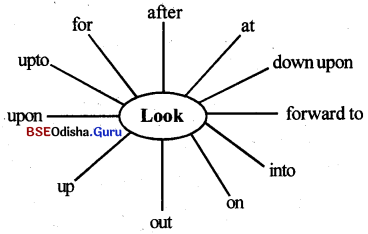
Combine the verb look with the particles shown as rays and use them in the following sentences.
The verb and the meaning of the two-word verb have been given in each case.
Example:
(a situation getting better) The weather is looking ___________ after the stormy days.
(Answer = up) (ଭଲ ହେବାରେ ଲାଗିଛି)
(i) (to be careful) ‘Look ______________! There might be a snake there !’
Answer:
Look out (ସତର୍କ ରୁହ) ! There might be a snake there!
(ii) (to be care of) Grandma looked ____________ Fakirmohan.
Answer:
Grandma looked after ( ଯନ୍ତ୍ର ନେଉଥିଲେ) Fakirmohan.
(iii) (to investigate) A team of experts is looking _____________ this problem.
Answer:
A team ofexperts is looking jnto (ତଦନ୍ତ କରୁଛନ୍ତି) this problem.
(iv) (to consider somebody in a particular way) I look _______________ Reeta as my sister.
Answer:
I look upon (ବିବେଚନା କରେ/ ମାନ୍ୟତା ଦିଏ) Reeta as my sister.
(v) (to search for something in a dictionary) Please look ___________ the word in a dictionary.
Answer:
Please look up (ଶବ୍ଦର ଅର୍ଥ ବାହାର କର) the word in a dictionary.
(vi) (to consider with contempt) Never look _______________ girls; they can work wonders.
Answer:
Never look down upon (ଘୃଣାକର ନାହିଁ) girls; they can work wonders.
(vii) (to expect something enjoyable) I am looking ______________ my birthday.
Answer:
I am looking forward to ( ଆଗ୍ରହର ସହିତ) my birthday.
(viii) (to think about or study) Look ______________ the following sentences.
Answer:
Look at (ଭଲଭାବରେ ଚିନ୍ତାକର) the following sentences.
(ix) (to watch something happening) Everyone looked _______________ in silence.
Answer:
Everyone looked at (ଚାହିଁଲେ) in silence.
![]()
(x) (to consider with respect) After the morning prayers all the children looked ______________ Swami.
Answer:
After the morning prayers all the children looked upon ( ସମ୍ମାନ ପ୍ରଦର୍ଶନ କଲେ) Swami.
(xi) (to search) Where is my grammar book? I have been looking _______________ it since morning.
Answer:
Where is my grammar book? I have been looking for (ଖୋଜୁଛି) it since morning.
Do similar exercises using break /come /give /go /put
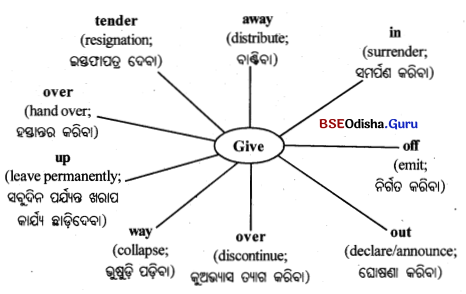
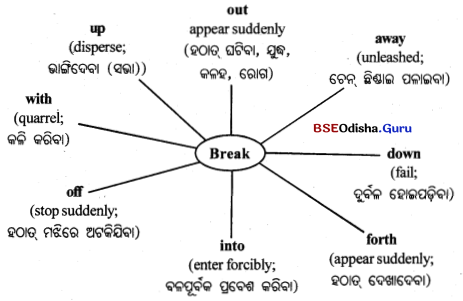
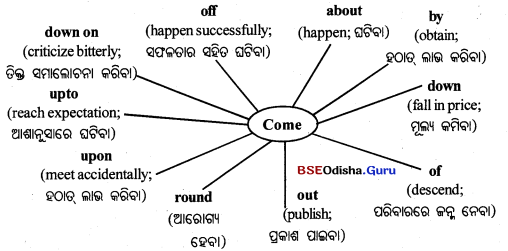
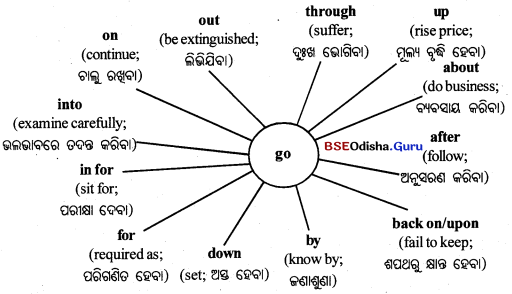
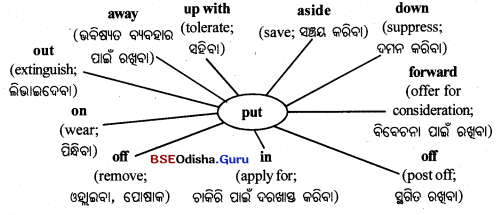
Activity – 5
Dictionary use. Study the diagram given below:
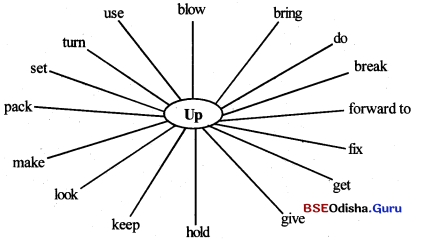
Combine the particle up with the verbs shown as rays and use them in the following sentences putting them into the correct tense form. The meaning of the two-word verb has been given in each case.
Example: (To search for something in a dictionary) Please __________________ up in the dictionary how the phrase is used.
Answer:
Look
![]()
(i) (To replace some lost thing) We must work hard to ________________ up the lost hours.
Answer:
make up (ଭରଣା କରିବାପାଇଁ)
(ii) (to stop working) It’s going to rain, we should _________________ up and go home.
Answer:
pack up (କାମ ବନ୍ଦ କରିବା ପାଇଁ)
(iii) (to start a business / an institution) I plan to ______________ up a business after getting the degree.
Answer:
set up (ବ୍ୟବସାୟ ଆରମ୍ଭ କରିବାକୁ)
(iv) (to exhaust something so that nothing is left) I have _______________ up all the petrol in my scooter.
Answer:
run up (ଶେଷ କରିଦେଇଛି)
(v) (to separate) The group _______________ up after the quarrel.
Answer:
broke up ( ଅଲଗା ହୋଇଗଲେ । ଛତ୍ରଭଙ୍ଗ ହେଲେ)
(vi) (to leave bed after sleeping) We usually _______________ up early in the morning.
Answer:
get up (ଶଯ୍ୟା ତ୍ୟାଗ କରୁ)
(vii) (a situation getting better) After three long rainy days the weather is _____________ up.
Answer:
looking up ( ସୁନ୍ଦର ଲାଗୁଛି)
(viii) (to come to a meeting) Only a few students ________________ up in the class due to heavy rain.
Answer:
turn up (ଆସନ୍ତି)
(ix) (to destroy by exploration) The platoon ofsoldiers _______________ up a bridge.
Answer:
blew up (ବିସ୍ଫୋରଣରେ ଉଡ଼ାଇ ଦେଲେ)
(x) (to take care of) We should ____________ up children with care.
Answer:
bring up (ଲାଳନ ପାଳନ କରିବା ଉଚିତ୍)
(xi) (to make something attractive) We _______________ up our house before my sister’s marriage.
Answer:
did up ( ସଜାଇଲୁ)
(xii) (to arrange something to happen) We have _______________ up the meeting for the next week.
Answer:
fixed up (ସ୍ଥିର କରିଛୁ)
(xiii) (to stop doing something) Don’t ________________ up hopes.
Answer:
give up (ତ୍ୟାଗକର ନାହିଁ)
(xiv) (to obstruct) A marriage procession _______________ up the traffic for an hour.
Answer:
held up (ବାଧା ଦେଲା)
(xv) (to maintain something at a high level) We must try to _________________ up the honour ofour school.
Answer:
keep up (ଅକ୍ଷୁଣ୍ଣ ରଖୁବା)
![]()
→ Do similar exercises using after/for/off/on /out Let there be a competition in the class.
Activity – 6
Replace the underlined expression with phrasal verbs using the verbs given in brackets.
(i) I don’t like the way Swami is being educated. (bring)
Answer:
brought up (ଲାଳିତପାଳିତ ହେଉଛି)
(ii) The government rejected the employees’ request for pay revision. (turn)
Answer:
turned down (ପ୍ରତ୍ୟାଖ୍ୟାନ କରିଦେଲେ)
(iii) The strike was cancelled. (call)
Answer:
called off (ସୁଗିତ କରାଗଲା)
(iv) We reduced our expenses after our father’s retirement. (cut)
Answer:
cut down (କମାଇ ଦେଲୁ)
(v) I disappointed my parents by my poor results. (let)
Answer:
let down (ହତାଶ କଲି)
(vi) I can hardly understand what you say. (make)
Answer:
make out ( ବୁଝିପାରେ)
(vii) Most children resemble their parents. (take)
Answer:
take after (ଦେଖିବାକୁ ଏକାପରି)
(viii)We called a doctor when my mother was ill. (send)
Answer:
sent for (ଡ଼କାଇଲୁ)
(ix) We continued working long after the evening. (keep)
Answer:
kept on ( ଜାରି ରଖଲୁ)
(x) Have you read the book I gave you? (go)
Answer:
gone through (ଭଲଭାବରେ ପଢ଼ିଛୁ)
Activity – 7
Combine one verb from group -A with a suitable particle from group – B. In this way, frame 10 phrasal verbs. Use them in sentences. Who will do it first in the class?
Group – A: break, bring, call, come, cut, get, give, go, keep, let, make, put, set, take.
Group – B: after, at, away, by, down,for,from, in, into, off, on, out, over, to, up.
Answer:
Group A : (Verbs)
Group B : (Particles)
![]()
Answers :
(i) break down: He broke down (ହଠାତ୍ କାନ୍ଦିପକାଇଲେ) on hearing the news.
(ii) bring up: educate (ଲାଳନପାଳନ କରିବା) – Who will bring up this orphan ( ଅନାଥ) ?
(iii) call out : call loudly (ଜୋର୍ରେ ଡ଼ାକିବା) – Mother called out Sonu.
(iv) come out : appear ଗାଡ଼ି ଭିତରକୁ ଯିବା) – Flowers come out in spring.
(v) cut down: reduce (ଖର୍ଚ୍ଚ କମାଇବା) – I cut down my expenses (SI©).
(vi) get into (board; ଗାଡ଼ି ଭିତରକୁ ଯିବା) – He got into the bus.
(vii) give up : discontinue (ସବୁଦିନପାଇଁ ତ୍ୟାଗକରିବାକୁ ଅଭ୍ୟାସ) – Please give up smoking.
(viii) go for: is known (ଜଣାଶୁଣା, ପରିଚିତ)- He goes for a clever boy.
(ix) keep on: continue (ଚାଲୁ ରଖିବା) – Keep on trying.
(x) let in: allow to come – The teacher let Madhabi in.
(xi) makeover: translate (ଅନୁବାଦ କରିବା) – Please make this passage over to Odia.
(xii) put up: stay (ରହିବା) – I am putting up (ରହୁଛି) in the school hostel.
(xiii) set on: instigate (ଉସୁକାଇବା) – Don’t set me on.
(xiv) Take off: remove (କାଢ଼ିପକାଇବା) – Take off your dirty shoes.
Activity – 8
Choose the correct particles and complete the phrasal verbs in the sentences.
1. Please turn _____________ the radio. (on, up)
Answer:
on (ଲଗାଅ)
2. Cholera broke _______________ everywhere. (down, out)
Answer:
out (ବ୍ୟାପିଗଲା)
3. The meeting came ______________ very successfully. (up, off)
Answer:
off (ସଫଳତାର ସହିତ ହେଲା
4. I do not give _____________ to anybody’s pressure. (out, in)
Answer:
in (ଆତ୍ମ ସମର୍ପଣକରେ ନାହିଁ)
5. I agree ______________ you on this point. (with, to)
Answer:
with
6. They have closed ________________ their old business. (up, down)
Answer:
down
7. I look ______________ him as my own father. (after, upon)
Answer:
upon (ସମ୍ମାନିତ କରେ)
![]()
8. Every month I lay ______________ a few rupees formy child’s education. (by, down)
Answer:
by (ସଞ୍ଚୟକରେ))
9. I could not make ______________ what he was saying. (up, out)
Answer:
out
10. The police put ______________ the violence. (off, down)
Answer:
down (ଦମନକଲେ)
11. Nobody was at the airport to see him ______________. (out, off)
Answer:
off (ବିଦାୟ ଦେବାକୁ)
12. Why did he turn _______________ your request? (down, off)
Answer:
down
13. A nuclear war cannot be ruled _________________ in the future. (out, over)
Answer:
out (ଅସ୍ଵୀକାର କରାଯାଇନପାରେ)
14. The thief made _______________ with a large amount of money. (off, out)
Answer:
out (ନେଇ ପଳାଇଲା)
15. The old man passed _______________ in his sleep. (away, out)
Answer:
away ( ମରିଗଲା)
Activity – 9
Replace the word(s) in italics with their corresponding phrasal verbs choosing from the list given)
(get over, pack up, look up, brought out, keep on, do away with, drop out, stand by, go back on, fell through)
1. He has published a new book.
Answer:
He has brought out (ପ୍ରକାଶ କରିଛି) a new book.
2. We are tired. We must stop working now.
Answer:
We are tired. We must pack up (କାର୍ଯ୍ୟବନ୍ଦ କରିବା ଜରୁରୀ) now.
3. You can continue working if you like.
Answer:
You can carry on / go on / keep on (ଚାଲୁରଖ୍ପାର) working if you like.
4. Will you help me during my bad days?
Answer:
Will you stand by me during my bad days?
![]()
5. He has not been able to overcome his fears.
Answer:
He hasn’t been able to get over ( ଦୂରେଇ ରହିବାପାଇଁ) his fears.
6. We withdrew from the match after a quarrel.
Answer:
We dropped out (ଓହରିଗଲୁ) from the match after a quarrel.
7. The talk between India and Pakistan failed due to many disagreements.
Answer:
The talk between India and Pakistan fell through (ଅସଫଳ ହେଲା) due to may disagreements.
8. He promised to help me, but later he failed to keep his promise.
Answer:
He promised to help me, but later (ପରେ) he went back on (ଓହରିଗଲା) his promise.
9. India has stopped having the caste system.
Answer:
India has done away with (ଦୂରେଇଯାଇଛି) the caste system (ଜାତିପ୍ରଥା).
10. The situation is improving day by day.
Answer:
The situation is looking up ( ଭଲ ହେବାରେ ଲାଗିଛି।ସୁଧୁରୁଛି) day by day.
Activity – 10
Choose the appropriate phrasal-prepositional verb from the given list for each of the sentences below and complete the sentences.
(run out of, get on (well) with, come out with, looking forward to, put up with, catch up with, come in for)
1. When the whole class was worried how to solve the problem, Suresh ________________ a solution.
Answer:
came out with
2. We all are eagerly ______________ our sister’s wedding.
Answer:
looking forward to (କାମ ବନ୍ଦ କରିବା ପାଇଁ)
3. I _____________ a rude shock when my friend cheated me.
Answer:
came in for
4. We have _____________ sugar. Can you buy some?
Answer:
run out of ( ସାରି ଦେଇଛୁ )
5. We do not ________________ our new neighbour.
Answer:
get on (well) with
6. Who can _______________ such mischief?
Answer:
put up with ( ସହିପାରିବ)
7. The child walked fast to _____________ his parents.
Answer:
catch up with (ସାଥରେ ଯାଇ ମିଶିବାପାଇଁ)
Phrasal Verbs Additional Questions With Answers
I. Fill in the blanks with participles and complete the Phrasal verbs in the sentences.
1. I could not make _____________ what he said.
Answer:
out
2. The meeting came _______________ successfully.
Answer:
off
![]()
3. I agree _______________ you on this point.
Answer:
with
4. The police put ____________ the violence.
Answer:
down
5. I do not give _______________ to anybody’s pressure.
Answer:
in
6. The workers have decided to call ________________ their strike.
Answer:
off
7. I bank _____________ my teachers for my study.
Answer:
on
8. The old man passed ____________ last night.
Answer:
away
9. He turned ____________ my request.
Answer:
down
10. His friends went to the airport to see him ____________.
Answer:
off
11. Mr. Routray set _____________ a school in the village.
Answer:
up
12. Don’t put _______________ today’s work till tomorrow.
Answer:
off
13. They have closed ______________ their business.
Answer:
down
14. Shall I put ____________ the light?
Answer:
out
15. Winter has set ________________.
Answer:
in
16. I look _________________ him as my own father.
Answer:
upon
17. Cholera has broken ______________ in this town.
Answer:
out
18. The thief made ______________ with a large amount of money.
Answer:
off
![]()
19. A nuclear war cannot be ruled ______________ in future.
Answer:
out
20. His result let _____________ us.
Answer:
down
21. The terrorists blew _______________ the railway track.
Answer:
up
22. Please turn ____________ the radio.
Answer:
on
23. The noise will die _____________.
Answer:
down
24. Every month I lay _______________ a few rupees for my child’s education.
Answer:
by
25. The chief guest gave _____________ the prizes.
Answer:
away
26. Chess calls _____________ concentration of mind.
Answer:
for
27. I shall call ______________ my friend tonight.
Answer:
on
28. Shall I put ______________ the light?
Answer:
out
29. Try to give ______________ bad habits.
Answer:
up
30. The thieves broke _____________ the house.
Answer:
into
31. Riki and Miki have Men _____________ over a petty matter.
Answer:
out
32. Please carry _____________ the plan.
Answer:
out
33. Please put ______________ your new dress.
Answer:
on
34. I never answer my parents ________________.
Answer:
back
![]()
35. The soldiers put _______________ a brave fight.
Answer:
up
36. I don’t care _____________ chicken curry.
Answer:
for
37. I agree _______________ you.
Answer:
with
38. Pabak got ______________ his difficulties.
Answer:
over
39. I wouldn’t go back ________________ my words.
Answer:
on
40. Carry _______________ with your work.
Answer:
on
41. The girl takes ______________ her mother.
Answer:
after
42. Please go ______________ the letter.
Answer:
through
43. The students did ________________ the school budding.
Answer:
up
44. The bus broke _______________ on the way.
Answer:
down
45. The new headmaster took ______________ the charges yesterday.
Answer:
over
46. The police are looking _____________ the matter.
Answer:
into
47. The thieves got ______________ with a lot of money.
Answer:
away
48. You shouldn’t break ____________ when someone is speaking.
Answer:
in
49. I never put up ______________ angry words.
Answer:
with
50. The price of gold may come _______________.
Answer:
down
51. I have rim out ______________ time.
Answer:
of
52. He tried to make _______________ his studies on holidays.
Answer:
up
53. He couldn’t keep up ____________ the class.
Answer:
with
54. It is better to throw ______________ the broken chairs.
Answer:
away
![]()
55. I came ______________ a strange animal on the way.
Answer:
across
56. My friend pointed ___________ my mistake.
Answer:
out
57. Who is looking _______________ the old man?
Answer:
after
58. Your father was asking _____________ you.
Answer:
after
59. You must stand ____________ him during his distress.
Answer:
by
60. Don’t look down ____________ girls; they can do wonders.
Answer:
upon
61. It is raining, we should pack ___________ and go home.
Answer:
up
62. Please look ____________ in the dictionary how the phrase is used.
Answer:
up
63. He was brought _____________ by his uncle.
Answer:
up
64. We sent ____________ a doctor when mother was ill.
Answer:
for
65. I never let _____________ my parents.
Answer:
down
66. He has picked ______________ some bad habits.
Answer:
up
67. Lots of people go in ____________ cricket these days.
Answer:
for
68. He set _______________ on a long journey.
Answer:
out
69. The reporter took ________________ the speech.
Answer:
down
70. Keep ______________ your courage.
Answer:
up
71. I will call you _______________ if I need your help.
Answer:
up
72. The plane took _______________ late.
Answer:
off
73. The factory turns _____________ two hundred cars a week.
Answer:
out
74. Two men were fighting and the rest were looking _____________.
Answer:
on
75. Let’s break ______________ for ten minutes.
Answer:
off.
II. Replace the underlined words with the corresponding phrasal verbs.
1. He has published a new book.
Answer:
brought out
2. The situation is improving day by day.
Answer:
getting on
3. Will you help during my bad days?
Answer:
stand by
![]()
4. You can continue working if you like.
Answer:
keep on
5. We withdrew from the match after a quarrel.
Answer:
dropped out
6. India has stopped having the caste system.
Answer:
done away with
7. I don’t like the way Swami is being educated.
Answer:
brought up
8. The strike was cancelled.
Answer:
called off
9. The meeting was postponed.
Answer:
put off
10. We have reduced our expenses.
Answer:
cut down
11. Many children resemble their parents.
Answer:
take after
12. My father rejected my request.
Answer:
turned down
13. I can hardly understand what you say.
Answer:
make out
14. Have you read the book I gave you?
Answer:
gone through
15. We called a doctor when my mother was ill.
Answer:
sent for
16. We continued working long after the evening.
Answer:
kept on
17. I disappointed my parents by my poor results?
Answer:
let down
18. The rich man died last night.
Answer:
passed away
19. I rejected her request.
Answer:
turned down
![]()
20. They have closed their business permanently.
Answer:
closed down
21. Malaria spread everywhere.
Answer:
broke out
22. I couldn’t understand what he said.
Answer:
make out
23. A team of experts is investigating this problem.
Answer:
looking into
24. The chief guest distributed the prizes.
Answer:
gave away
25. Can you choose the correct answers?
Answer:
pick out
26. He has not been able to overcome his fears.
Answer:
get over
27. The talk between India and Pakistan failed due to many disagreements.
Answer:
fell through
28. He tried to compensate for all the trouble he had caused.
Answer:
makeup
29. Lots of people enjoy cricket these days.
Answer:
go in for
30. I won’t fail to keep my word.
Answer:
go back on
31. Summer has started.
Answer:
set in
32. He established a school for the poor children.
Answer:
set up
33. Shall I extinguish the light?
Answer:
put out
34. The aeroplane left the ground smoothly.
Answer:
took off
35. The police suppressed the revolt.
Answer:
put down
36. A marriage procession obstructed the traffic for an hour.
Answer:
held up
![]()
37. He is searching a new house.
Answer:
looking for
38. They have settled their quarrel.
Answer:
made up
39. Save something for future.
Answer:
lay by
40. I’ll summon you if I need your help.
Answer:
call up
41. It is difficult to tame that horse.
Answer:
break in
42. Let’s stop for rest for ten minutes.
Answer:
break off
43. The children decorated the building.
Answer:
did up
44. The group separated after the quarrel.
Answer:
broke up
45. I am making progress quite well.
Answer:
getting on with
